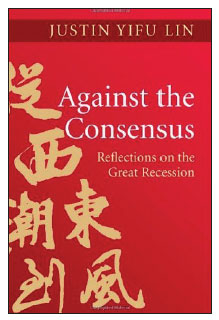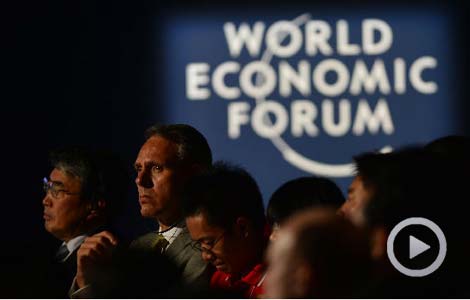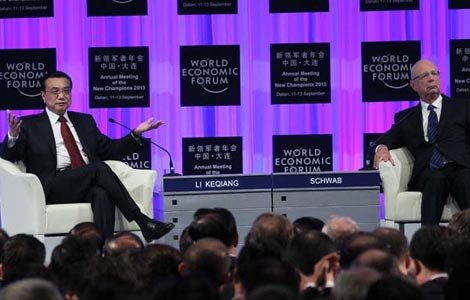Economist calls for global Marshall Plan and currency
Updated: 2013-09-13 11:44
By Michael Barris in New York (China Daily)
|
||||||||

In June 2008, Justin Yifu Lin had barely settled into his new post as the first World Bank chief economist from the developing world, when the global financial system collapsed.
From his front-row seat on the calamity he saw numerous economists -"believing that the crisis would last three to seven quarters at most, like other crises in the past half-century" - advise their governments to stick to the conventional playbook: pumping in emergency funds to shore up the system.
But five years after the worst financial and economic meltdown since the Great Depression, the global economy remains in slow-recovery mode. Despite encouraging recent statistics - the declining US unemployment figures and positive manufacturing data in debt-ridden Europe - it is clear that many countries "are still grappling" with how to ensure viable long-term economic recovery, according to Lin, a native of Yilan County, Taiwan who served for 15 years as founding director of the China Centre for Economic Research at Peking University before joining the World Bank.
Lin has written Against the Consensus: Reflections on the Great Recession (Cambridge University Press). The book, which goes on sale Sept 17, offers an unorthodox perspective on the financial crisis's cause, why it was so serious and widespread, and its likely evolution.
While many point to East Asian economies as the cause of the crisis, due to their export-oriented strategies, accumulation of foreign reserves as self-insurance and the undervaluation of the yuan, Lin instead argues that the combination of financial deregulation in the US and loose monetary policy ultimately triggered the housing bubble and its meltdown. "As early as 2003, academics and policymakers in high-income countries began pointing at China as the culprit behind the mounting global imbalances," Lin writes, "even though China did not begin to amass a large trade surplus until 2005".
He writes that China's large current account surplus "reflects mainly its high domestic savings", even though household savings in China actually are no higher than in India and many other countries. A large share of corporate savings - partly fueled by surplus labor - is what makes China's saving pattern unique, he says.
Illustrating his embrace of a changwu attitude - "observing the world as though seeing it for the first time, without preconceived notions" - Lin not only proposes the creation of a global Marshall Plan to stimulate investment infrastructure, but also of a new global reserve currency. His suggestion is made all the more intriguing by the timing of the book's release, coming just a week after the G20 summit in St Petersburg, Russia wraps up. The Marshall Plan was the American program to aid Europe to help rebuild its economies after the end of World War II.
Instead of "putting out one fiscal fire after another in sovereign debt crisis countries through emergency IMF financing and other rescue packages", Lin wants the G20 to provide parallel funds to multilateral development banks, including the World Bank and regional development banks, "with the capacity to design and implement infrastructure investment projects".
He writes that structural reforms are needed for advanced countries to regain their competitiveness and return to normal growth. Without serious change to the system, debt-burdened nations in Southern Europe are likely to need "repeated and increasingly large" rescue packages and the US and Japan will suffer with slow growth, high unemployment and accumulating public debt, according to Lin.
"In today's low-interest rate environment, infrastructure projects are good investments for private funds, including pension and sovereign-wealth funds," he wrote in a June 27 essay in the Wall Street Journal. "Multilateral development banks and governments could help make infrastructure projects attractive to private investors by giving them seniority or guaranteed loans."
Such a program would "benefit both developed and developing countries", Lin wrote. "In advanced economies, the growth that this generates will give governments the breathing space to implement structural reforms." Well-chosen infrastructure investments could directly create jobs in the hard-hit construction and manufacturing sectors, and produce indirect job growth in the service sectors, he said.
While Lin praises world governments' efforts to avoid a worst-case scenario during the crisis, it is obvious that he holds himself apart from the economists who recommended ordinary measures to deal with a crash that was unlike anything experienced since the 1930s.
michaelbarris@chinadailyusa.com
(China Daily USA 09/13/2013 page11)
Most Viewed
Editor's Picks

|

|

|

|

|

|
Today's Top News
Economist calls for global Marshall Plan and currency
'Green Fence' puts pressure on US recyclables
Markets hold breath over Chinese cotton policy
One in four men in Asia-Pacific admit to rape
China supports trade ties: Michigan governor
WB head to discuss climate in China visit
US moves against China firms criticized
Navy chief cruises into DC
US Weekly

|

|













